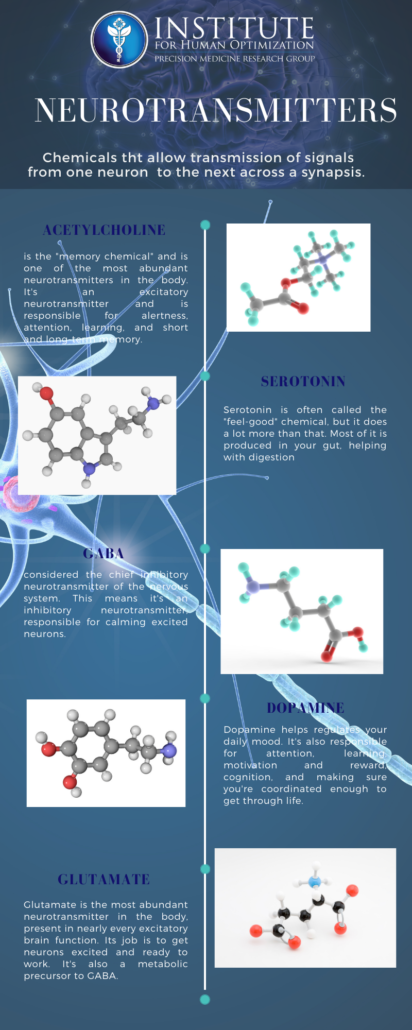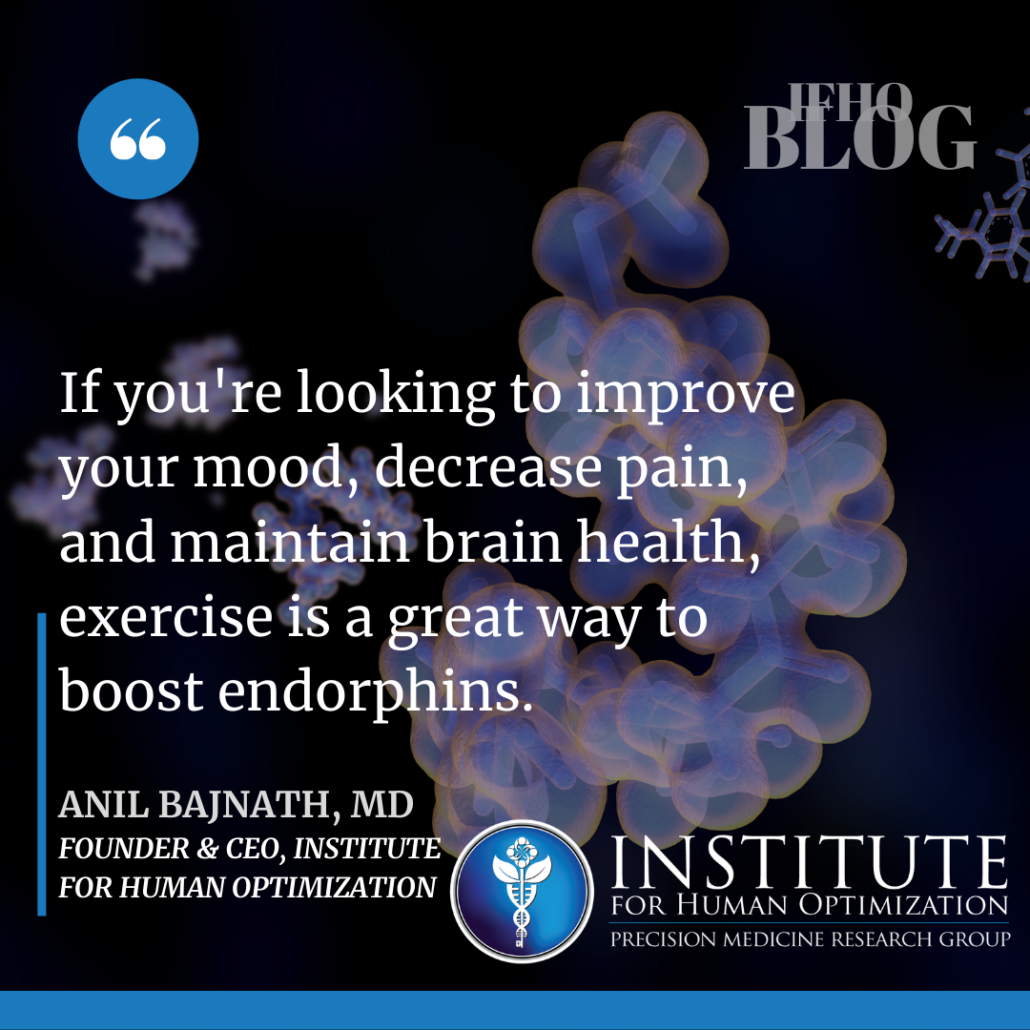Your brain is a complicated biological machine capable of running all of your body’s functions, mental abilities, and sensory perceptions simultaneously. In reality, many facets of your personality and life choices come from the chemical substances coursing through your brain called neurotransmitters. By understanding which chemicals cause which reactions, you can learn to hack your brain to enhance your mood, improve creativity, enhance focus, and even decrease your chances of having neurodegenerative diseases as you age. In this second part of our Brain Health Series (read part one here), we cover the functions of the major neurotransmitters and what you can do to help regulate them for your own well-being.
You are a walking eco-system. Your life is governed by the actions of all the organisms, structures, and mechanisms you’re made of. If your gut bacteria thrive on sugar, you’ll crave sugar. If your genetics determine you have red hair, you’ll go through life with red hair.
One of the most important mechanisms happening in your body is the delicate balance of neurotransmitters coursing through your brain. These are chemical substances that react to impulses from the nerve cells. Electrical signals are not able to jump the gap between neurons, they must be first be turned into chemical signals. Neurotransmitters are these signals, traveling to muscles, tissues, and nerves to make the right things happen at the right time.
There are two types of neurotransmitters: excitatory and inhibitory. Excitatory neurotransmitters excite the neuron. They let it know that it’s time to fire. Inhibitory are the exact opposite, they tell the neuron to relax, nothing is going on.
Understanding these mechanisms can be a powerful tool for hacking your health, especially in regards to your mood, drive, and mental capacities. Each type of neurotransmitter is responsible for a specific function in your body and by learning about them, you set yourself up to better understand your own brain and its cycles.

Serotonin
Serotonin is one of the more well-known neurotransmitters. It’s produced in the central nervous system and is responsible for anger regulation, body temperature, mood, sleep, pain modulation, and appetite.
Many people cite low serotonin levels as the main cause of depression, though this has not been clinically proven. The reason this theory for why people suffer from depression has become so popular is because of the benefits many people find from taking SSRIs.
SSRI stands for serotonin repute inhibitor, but we know them by the names pharmacological companies use, Xanax, Lexapro, Prozac, Zoloft, and Paxil. These drugs work by inhibiting serotonin uptake back into the neuron, increasing serotonin levels, and changing the way you react to emotional-laden information.
Cowen, P. J., & Browning, M. (2015). What has serotonin to do with depression?. World psychiatry : official journal of the World Psychiatric Association (WPA), 14(2), 158–160. https://doi.org/10.1002/wps.20229
Serotonin is often called the “feel-good” chemical, but it does a lot more than that. Most of it is produced in your gut, helping with digestion. If you’ve ever eaten something foul, your body produced extra serotonin to speed up the digestive process and get that food through faster than usual.
Serotonin works with another neurotransmitter, dopamine, to balance your sexual urges. Too much serotonin and not enough dopamine can result in hypoactive sexual desire disorder (HSDD), meaning extremely low sex drive. This is why the use of SSRIs can cause sexual dysfunction.
You may have low serotonin levels if you experience:
- Increased anger or aggressiveness
- Depression
- Obsessive-compulsive disorder (OCD)
- Irritable bowel syndrome (IBS)
- Tinnitus
- Fibromyalgia
- Bipolar disorders
- Anxiety disorders
- Increased anger or aggressiveness
- Depression
- Obsessive-compulsive disorder (OCD)
- Irritable bowel syndrome (IBS)
- Tinnitus
- Fibromyalgia
- Bipolar disorders
- Anxiety disorders
Contrarily, you may have high levels of serotonin if you experience:
- Shyness
- Inferiority complex
- Nervousness
- Vulnerability to criticism
- Intense fear of being disliked
- Desire for social contact but fear about it
There are two main reasons why someone might have low serotonin: they may not be making it, or their brain isn’t using it properly. Some studies suggest that increasing vitamin D can boost serotonin levels as well as eating plenty of tryptophan-rich foods. Tryptophan is an amino acid that assists in the creation of serotonin and is found in chicken, eggs, fish, turkey, shrimp, mushrooms, spinach, raw tofu, liver, salmon, beef, lamb, soybeans, scallops and pumpkin seeds.
Seratonin can also be boosted naturally by spending at least 15 minutes in the sun, exercising, and treating yourself to a massage now and then.
Dopamine
Dopamine is serotonin’s buddy and helps regulates your daily mood. It’s also responsible for attention, learning, motivation and reward, cognition, and making sure you’re coordinated enough to get through life.
Dopamine is the “pleasure” chemical, and its main job is to make sure you feel good when you do something good for you to make sure you do it again. Some researchers even think that higher levels of dopamine gave our ancestors a social edge over other apes, propelling us quickly through the evolutionary process to where we are today.
Dopamine would have let our ancestors know they were doing something right. For example, berries contain natural sugars that boost dopamine levels. Finding a berry bush as an early human was quite a stroke of luck as berries are more calorie and nutrient-dense than other wild foods. That dopamine spike kept them coming back for more.
In modern times, dopamine is typically more feast than famine. We have engineered our environments to give us hits of that dopamine “high” as often as possible. Sugar is a major highjacker of dopamine that acts like a drug to the brain, even causing addiction. This is why it’s important to limit sugar intake and nourish good gut bacteria. Even your phone, with all its buttons, lights and sounds, releases dopamine in the brain.
You may have low levels of dopamine if you frequently experience:
- Depression
- Anhedonia (inability to experience pleasure
- Social anxiety
- Parkinson’s disease
- Heavy menstrual cycles
- Male secondary hypogonadism
- Learning disorders
- ADD
- Chemical addictions
High levels of dopamine can cause psychosis, schizophrenia, hyper-social activity, and increased libido. Everything in your body depends on homeostasis; system balance.
If you feel you may have low dopamine, you can try introducing wild game meat, beef, fish, oats, and dark chocolate to your diet. These contain tyrosine, an important amino acid that helps with the production of dopamine in the body.
GABA
Gamma-aminobutyric acid (GABA) is the chief inhibitory neurotransmitter of the nervous system. This means it’s an inhibitory neurotransmitter, responsible for calming excited neurons. When GABA is released, you feel relaxed and have less anxiety. It also has anti-convulsive effects, though its role in treatment for epilepsy remains unclear.
You may have a GABA imbalance if you frequently experience:
- Anxiety
- Insomnia
- Depression
- Seizure disorders
- Panic disorders
People who have an imbalance of GABA sometimes require medication to manage their symptoms. Pharmacological drugs have been developed to act as agonists for the GABA receptor site and are classified into two main types: benzodiazepines and non-benzodiazepines.
Benzodiazepines are essentially tranquilizers. They include popular drugs such as Klonopin and Valium, which are known to carry risks of dependence, withdrawal, and negative cognitive side effects. Both benzodiazepines and non-benzodiazepines typically give users anti-anxiety and relaxing effects that temporarily “take the edge off”.
GABA is found in varieties of green, black, and oolong tea, as well as in fermented foods including yogurt, tempeh, and kimchi. Other foods that contain GABA or boost its production include whole grains (oat, barley, wheat), soy, lentils, and other beans; nuts including walnuts, almonds, and peanuts; fish including shrimp and halibut; citrus, cheese, spinach, broccoli, and rice.
Acetylcholine
Acetylcholine is the “memory chemical” and is one of the most abundant neurotransmitters in the body. It’s an excitatory neurotransmitter and is responsible for alertness, attention, learning, and short and long-term memory. It also aids in skeletal muscle contraction to help you perform all your daily activities, from sweeping the floor to lifting weights.
Because it controls memory, people with acetylcholine imbalances often suffer from:
- Alzheimer’s disease
- Dementia
- Myasthenia Gravis
- Memory lapses
- Calculation difficulties
- Impaired creativity
- Decreased arousal
- Impaired judgement
- Diminished comprehension
Alzheimer’s disease and dementia are the most common neurodegenerative disease experienced by the aging population. Though researchers are not completely sure what the main causes are, people who suffer from memory-loss disorders generally have lower levels of acetylcholine.
This is why it’s helpful to eat foods that impact this vital neurotransmitter, such as fatty pork, liver, fried eggs, beef, tofu, nuts, cream, milk, and fatty cheeses. These foods contain high amounts of choline, the amino acid responsible for boosting acetylcholine production in the body.
People who suffer from acetylcholine imbalances are sometimes given medications called anticholinergics. These work by blocking acetylcholine from binding to its receptors and inhibiting parasympathetic nerve functions. They are often prescribed to alleviate symptoms of Parkinson’s disease, urinary incontinence, and COPD.
Glutamate
Glutamate is the most abundant neurotransmitter in the body, present in nearly every excitatory brain function. Its job is to get neurons excited and ready to work. It’s also a metabolic precursor to GABA. Glutamate plays a vital role in synaptic plasticity—the strengthening or weakening of the signals between neurons over time. This is how your memories are formed, not by the creation of new neurons, but by strengthening the connections between them.
You may have an excess of glutamate in the brain if you experience:
- Restlessness
- Inability to focus
- Hyperalgesia (amplified pain)
- Anxiety
You may have heard of monosodium glutamate, or MSG, a chemical compound often put in commercially prepared food to make it taste better. MSG acts on glutamate receptors and because the neurotransmitter is required in almost all metabolic activities, this wreaks havoc on the entire body.
Niaz, K., Zaplatic, E., & Spoor, J. (2018). Extensive use of monosodium glutamate: A threat to public health?. EXCLI journal, 17, 273–278. https://doi.org/10.17179/excli2018-1092
If you’re looking to improve brain and metabolic health, glutamine is a good place to start. Dietary sources include beef, chicken, fish, dairy, eggs, beans, beets, celery, kale, Brussel sprouts, papaya, wheat, and fermented foods like miso and kimchi.
Endorphins
Endorphins are discussed in fitness circles as the chemicals responsible for that “runner’s high” people experience after vigorous physical activity. Their main job is to minimize pain and discomfort and understanding how they work led to the development of opioid drugs like codeine, morphine, fentanyl, and oxycodone.
Using positron emission tomography (PET) scans, researchers were able to view athlete’s brains both before and after exercise. They found an increase in the release of endorphins after exercise. This led to a wealth of research on how exercise affects our mood, ability to focus, and even clinical depression.
Craft, L. L., & Perna, F. M. (2004). The Benefits of Exercise for the Clinically Depressed. Primary care companion to the Journal of clinical psychiatry, 6(3), 104–111. https://doi.org/10.4088/pcc.v06n0301
You may have low endorphin levels if you experience:
- Depression
- Chronic headaches
- Fibromyalgia
- Low energy
- Chronic pain thought the body
If you’re looking to improve your mood, decrease pain, and maintain brain health, exercise is a great way to boost endorphins. You can also meditate or practice yoga, eat some dark chocolate, or do an activity that makes you laugh. Feeling good is usually an indicator that you’re doing the right things.

At the Institute for Human Optimization, we utilize a unique approach to brain health optimization by taking into account your unique genomic blueprint. We are accurately able to identify patterns of genes involved in neurotransmitter synthesis and metabolism along with risk factors for premature cognitive decline. We then correlate this data with personalized brain health assessments to determine any underlying brain-based imbalances and give you relevant lifestyle recommendations.

